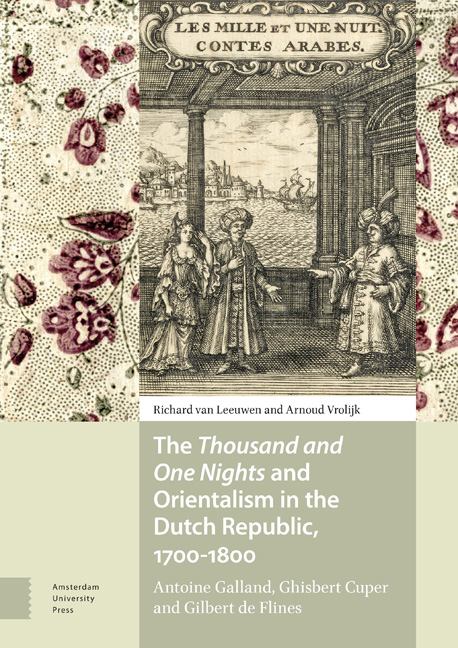 Thousand and One Nights and Orientalism in the Dutch Republic, 1700–1800
Thousand and One Nights and Orientalism in the Dutch Republic, 1700–1800 Book contents
- Frontmatter
- Contents
- Introduction
- 1 The Thousand and one nights and literary Orientalism in Europe
- 2 Dutch Orientalism before 1700
- 3 Antoine Galland and Ghisbert Cuper
- 4 The early editions of the Nights
- 5 Gilbert de Flines
- 6 Later editions in the eighteenth century
- 7 Dutch Orientalism in the eighteenth century
- Conclusion
- Appendix 1 Bibliographic survey of Dutch editions, 1705-1807
- Appendix 2 The David Coster engravings
- Appendix 3 Text samples of the Dutch Nights
- Appendix 4 French and Dutch quotations
- Illustration credits
- Bibliography
- Index
6 - Later editions in the eighteenth century
Published online by Cambridge University Press: 21 November 2020
- Frontmatter
- Contents
- Introduction
- 1 The Thousand and one nights and literary Orientalism in Europe
- 2 Dutch Orientalism before 1700
- 3 Antoine Galland and Ghisbert Cuper
- 4 The early editions of the Nights
- 5 Gilbert de Flines
- 6 Later editions in the eighteenth century
- 7 Dutch Orientalism in the eighteenth century
- Conclusion
- Appendix 1 Bibliographic survey of Dutch editions, 1705-1807
- Appendix 2 The David Coster engravings
- Appendix 3 Text samples of the Dutch Nights
- Appendix 4 French and Dutch quotations
- Illustration credits
- Bibliography
- Index
Summary
Gilbert de Flines's translation enjoyed a steady popularity until the last quarter of the eighteenth century, and after Pieter Aldewerelt's 1738 edition it was reissued several times. Not all of these editions have come down to us, however, so in some cases our reconstruction can only be tentative. This is true for an edition which was advertised in the Leydse Courant of 20 August 1742. On that day, the Amsterdam bookseller Isaak Spaan announced that he had a ninth, ‘final’ part of the Nights in duodecimo format for sale which had not been published previously. The name of its translator was not mentioned. Spaan added that the whole set in nine parts was still available for 3 guilders and 14 stuivers. Where did the other eight parts come from? Spaan started his business only in 1742, which makes it rather unlikely that he was able to print a whole new edition, let alone a new translation, on such short notice. It must therefore be assumed that it was still the translation of Gilbert de Flines, except for the last part. The same advertisement gave ‘Keizersgracht, on the corner of Wolvenstraat’ as Spaan’s address, and this is exactly the same as Pieter Aldewerelt’s. Most likely, Spaan took over Aldewerelt's bookshop from his widow and probably also the remaining stock, including the Nights. It is the first edition to have drawn the attention of the eighteenth-century bibliographer Johannes van Abkoude in the 1743 edition of his Naam register of verzaameling van Nederduytsche boeken(‘Title list or inventory of Dutch books’), but the year 1724 mentioned by him must be a mistake, since this is many years before Spaan started his business. It is not likely that Van Abkoude ever saw the book.
Almost exactly two years later, in 1744, history repeated itself along similar lines. In the Leydse Courantof 24 August 1744 the Amsterdam bookseller Steven van Esveldt (active 1735-1776), who at that time had a shop in the Beurssteeg alley close to the old City Hall, also offered a complete duodecimo edition in nine parts for three guilders. Again, this edition is lost, but it is only reasonable to assume that it was still the same De Flines translation with an added ninth part.
- Type
- Chapter
- Information
- Thousand and One Nights and Orientalism in the Dutch Republic, 1700–1800Antoine Galland, Ghisbert Cuper and Gilbert de Flines, pp. 91 - 102Publisher: Amsterdam University PressPrint publication year: 2019


